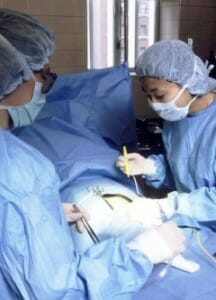The Medicines and Healthcare Products Regulatory Agency (MHRA) today recalled a medical device used in spinal fixation systems. Orthopaedic spinal surgeons used the device to correct deformities or repair degenerative diseases in the spine. The USS II Polyaxial 3D Head rings have been prone to cracking. This may result in the system loosening before the bone has a chance to heal.
Device Recalled in November 2019
At the end of last year DePuy Synthes issued an urgent field safety notice for the heads following repeated complaints of the implants cracking. They therefore voluntarily recalled their devices and advised surgeons to perform routine clinical follow-ups with patients who had the device implanted.
A DePuy representative, in November 2019 provided the following statement; “At DePuy Synthes, our first priority is to our customers and their patients. On November 11, 2019 DePuy Synthes voluntarily issued a medical device product removal of certain lots of USS II Polyaxial 3D Heads in several markets…These devices are part of a pedicle screw fixation system designed to stabilize the spine. The devices were recalled due to complaints of intra-operative sounds and cracking of the ring that helps to stabilize the spine. DePuy Synthes promptly notified relevant regulatory agencies and has begun notifying customers.”
Medical Device Alert
Trusts in the UK supplied with the affected spinal medical device received the alert today. The next steps are crucial to identify any faulty devices promptly. The alert advised Trusts to:
- Identify and quarantine all affected devices within 2 weeks.
- Follow up patients implanted with affected devices.
- Contact all patients who have had the device implanted for less than two years, within three months to discuss implant failure symptoms.
- If they do not have symptoms, an annual review for at least two years after the date of implantation.
- X-ray or CT scan anyone with symptoms to confirm an implant failure. Then explore treatment options using clinical judgement and patient consultations. Annual patient reviews for up to five years.
Your doctor or surgeon will consult with you and decide the best course of treatment. So, speak to them if you are concerned that you have been fitted with a USS II Polyaxial 3D Head.
If you are still concerned about a defective medical implant, speak to our experts to find out how to make a claim.





